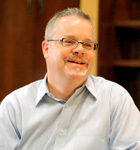James T. Breedlove is a patient man. He knew from the start of his law career—spanning more than 35 years—that he wanted to serve as general counsel of a large, publicly held company. For years, he worked toward his goal despite the significant barrier he knew all too well: In his generation, African-Americans were not given serious consideration for general-counsel positions in large companies. This fact did not deter him—in fact, it fueled him. Breedlove currently oversees a global team of more than 50 attorneys as the senior vice president, general counsel, and secretary of Praxair, Inc., the largest industrial gases company in North and South America.
Strategy to Share: Be Determined
“First, obtain the best possible education at the best possible schools. Secondly, maintain a laser focus on excellence, continuous learning, and continuous improvement. Lastly, develop and maintain a strong professional network. Then, have the patience to become outstanding at what you do and demonstrate strong leadership and judgment.”
What led you to a career in law?
I earned both JD and MBA degrees in 1975 as part of Harvard’s four-year JD-MBA program. The reason that I pursued a JD degree is because I felt that my strong analytical and verbal skills would make me a good lawyer. I pursued the MBA degree because I expected to ultimately become a corporate in-house lawyer and thought the financial, accounting, and strategy courses would make me a more knowledgeable and effective business partner.
What issues are you most passionate about?
I am passionate about the continuous improvement in the company’s global-compliance program, which has focused on antitrust, the Foreign Corrupt Practices Act, and environmental compliance. This reflects our view at Praxair that a strong global-compliance program makes good business sense and is the best safeguard to Praxair’s reputation.
Over the years
1975
James T. Breedlove earns JD and MBA degrees from Harvard
1975
Lands first job as an associate at Davis Polk & Wardwell on Wall Street
1979
Is appointed VP, general counsel, and secretary of Philip Morris Capital Corporation
1992
Serves as senior vice president and general counsel of a subsidiary at General Electric Capital Corporation
2002
Works as general counsel of GE Equipment Services Group
2004
Joins Praxair, Inc. as VP, general counsel, and secretary
2006
Is promoted to current role as senior VP, general counsel, and secretary of Praxair, Inc.
Under your leadership, Praxair has not lost a single antitrust lawsuit in seven years. To what do you attribute this achievement?
I’m quite proud of that accomplishment. The reason that we’ve won all the cases or the antitrust authorities have withdrawn their cases after investigation is that we take a very proactive, vigorous approach to our defense. In doing so, we work with highly skilled local antitrust counsel and, in appropriate cases, retain economists to help antitrust authorities better understand how the industrial-gases market functions. Another important reason that we’ve won all of the antitrust cases to date is that we take a very hands-on approach to crafting and executing our defense strategy. Unlike some other general counsels of large companies, we do not simply delegate the defense of such cases to outside counsel.
What has been the biggest challenge of your career?
The biggest challenge of my career in my early years—and I believe that it is a common challenge for African-Americans in the corporate world—was to be patient enough to keep slogging along in the face of significant barriers to achieve my ultimate goal. The reason this has been so challenging for African-Americans in my generation is that, for years, even the most capable African-Americans were not given serious consideration for promotion to general-counsel positions in large companies. Things have improved somewhat in the past 10 years as diversity initiatives have become more prevalent in corporate America, but there’s still much more that needs to be done to create a level playing field.
Describe your involvement with the Executive Leadership Council (ELC)?
I joined ELC in 2006 because I thought it would be immensely beneficial to network with and learn from the high caliber of ELC’s membership, and that initial belief has been borne out. I also believe that my ELC membership has been beneficial to many of my non-African-American colleagues at Praxair who’ve attended ELC receptions, dinners, and other events and seen the vast number of high-ranking and impressive African-Americans who occupy other corporate C-suites.


